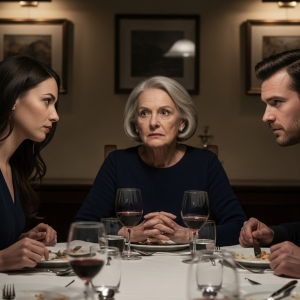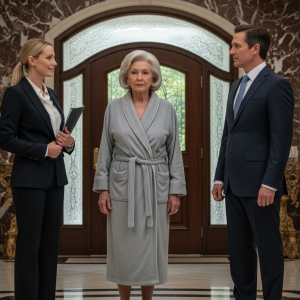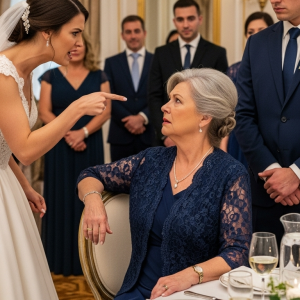Three words changed everything: “She’s waking up.” I wasn’t supposed to survive the surgery. I wasn’t supposed to hear what they’d done. But I did. And now, they were about to learn why you should never underestimate a woman with nothing left to lose.
The antiseptic smell of the hospital hit me first, a chemical sharpness that scraped away the fog. My eyelids felt sealed shut, but I forced them open to a blurry world of fluorescent lights and white ceiling tiles. A rhythmic beeping confirmed I was still among the living.
Rebecca’s face materialized above me, her makeup perfect, her smile practiced. Behind her, my son-in-law, David, glanced at a conspicuously expensive new watch. It was funny how my medical crises always seemed to coincide with his accessory upgrades.
“Mother, you’re finally awake,” Rebecca said, her voice dripping with the theatrical concern she’d perfected in high school drama. “We were so worried.”
I tried to speak, but my throat felt like I’d gargled gravel. My last clear memory was the searing pain in my head that had dropped me during dinner.
“Don’t strain yourself,” David said, his voice a smooth, professional balm. “Everything’s been taken care of while you were recovering.” That phrase, in my seventy-two years of experience, had never once preceded good news.
“What do you mean?” I managed to croak.
They exchanged a loaded glance. “Well,” Rebecca began delicately, “given your condition… and the stress… we sold the beach house.”
For a moment, I thought the aneurysm had damaged my hearing. “I’m sorry, what?”
“The Cape Cod property,” David clarified, as if I might own several. “The sale went through yesterday.”
My sanctuary. The house where I planned to spend my remaining years watching the ocean. “That’s impossible,” I whispered. “I never authorized any sale.”
David produced a folder with a flourish. “Actually, you did. Right here.” He pointed to a signature that vaguely resembled my own.
“The doctor explained that memory loss is completely normal after this kind of trauma,” Rebecca added helpfully.
I stared at the document, a void where the memory should have been. “You’re probably feeling disoriented,” David continued. “That’s why we took care of this for you. The money will go toward your care. We found a lovely facility in Illinois.”
Illinois. Two thousand miles from the ocean, from everything I knew. “How long was I unconscious?”
“Six days,” Rebecca said. “The surgery was very complicated. We weren’t sure you’d…” She let the sentence hang. They weren’t sure I’d survive, but they had been sure enough to liquidate my most valuable asset.
“The timing seems remarkably… efficient,” I observed.
As they left, I saw the monogram on David’s briefcase. Under his initials was a small logo: Thornfield & Associates, Real Estate Law. My son-in-law wasn’t just any lawyer. He was a real estate specialist who had just completed a very significant transaction while I lay in a coma. The pieces weren’t fitting, but I knew I was no longer just a patient. I was a puzzle to be solved.
Sleep offered no escape. By morning, I had a plan. My new nurse, Eleanor Rodriguez, had the competent, no-nonsense demeanor of someone who sees more than she says.
“How are we feeling today?” she asked cheerfully.
“Like someone whose house was sold while she was in a coma,” I replied. “Which is either remarkably efficient family management or something considerably more problematic.”
Eleanor’s professional smile softened into something genuine. “That does sound unusual,” she said, checking my IV. “Real estate transactions typically require the owner to be… present.”
I’d spent my life in academia; I knew how to recognize an ally. “Mrs. Wilson,” she said quietly, “in my experience, when family handles major financial decisions for an incapacitated relative, they usually discuss it with the medical staff. To ensure it aligns with the recovery plan.”
“And did they?”
“Not that I’m aware of,” she confirmed. “I’d advise someone in your situation to request copies of all documents. And perhaps review your own medical records, to understand exactly what happened before your surgery.”
When Rebecca and David returned, I was ready. “I’d like to understand the timeline of the house sale,” I began.
David launched into a smooth, rehearsed explanation. I had supposedly called him three days before my aneurysm, asking him to prepare the documents, which I then signed at my house.
“It’s a plausible story,” I said, my voice neutral. “But you’re a real estate attorney, David. You’ve never mentioned that specialty before.”
A flicker of tension crossed his face. “It didn’t seem relevant.”
“Except, of course, when your mother-in-law needed to sell her house during a medical emergency,” I mused. I looked at my daughter, noticing for the first time her new jewelry, the expensive handbag. The signs of a recent financial windfall were all over her.
That night, I made another decision. If they thought they were dealing with a confused old woman, they had forgotten who I was. Thirty years of academic politics taught me that the most dangerous opponents are the ones who smile while they plot your demise. It was time to remind them that retirement had not made me stupid.
The next morning, my neurologist, Dr. Chen, reviewed my chart. “Mrs. Wilson, let’s discuss your medication history. What were you taking before the aneurysm?”
I listed my prescriptions, then added, “And recently, David had been bringing me some… supplements. He said they’d help with fatigue. They came in unmarked capsules.”
Dr. Chen’s pen stopped moving. “He brought a home blood pressure monitor as well,” I continued. “He said my readings seemed high and was very insistent I take them.”
“I’m going to order some additional blood work,” Dr. Chen said, her gaze direct. “I want to check for any residual substances that might have contributed to your cardiovascular event. I think it’s worth investigating whether what you were taking was actually ‘supplements’.”
That afternoon brought an unexpected savior: my younger sister, Catherine, a recently retired corporate attorney who looked like an avenging angel in a Chanel suit.
“I didn’t know Rebecca had called you,” I said, embracing her.
“She didn’t,” Catherine replied, her tone sharp. “I heard about your ‘situation’ through other channels. Tell me everything.”
I laid out the story: the house sale, the supplements, the forged signature. Catherine listened, her face a mask of cold fury. When I finished, she looked up from her legal pad. “Margaret, how long has it been since we discussed the arrangements we made after Thomas died?”
A memory clicked into place. “The trust,” I said slowly.
“The irrevocable trust,” Catherine confirmed. “Established fifteen years ago. I am the trustee. You have lifetime residency rights, but absolutely no power to sell or transfer the property. You couldn’t have sold that house even if you wanted to.”
The room tilted. “So the sale is fraudulent?”
“Completely,” Catherine said with a grim smile. “It appears your son-in-law has involved himself in a criminal transaction. He tried to sell a property he had no legal right to touch.”
The door opened and Dr. Chen entered, holding a file. She closed the door behind her. “Mrs. Wilson, your toxicology results are back. They show significantly elevated levels of blood pressure medication in your system. Levels that would require deliberate, sustained administration over several weeks.”
“It was attempted murder,” I said flatly.
Dr. Chen didn’t disagree. “What happened to you was not natural, and it was not accidental.”
The pieces of the puzzle slammed together, forming a picture of breathtaking cruelty. David hadn’t just been waiting for me to die. He had been actively, methodically trying to kill me.
When Rebecca arrived, Catherine and I were ready. “We’ve been discussing some interesting legal questions about property ownership,” I began. “It seems the house isn’t actually mine to sell.”
The color drained from Rebecca’s face. “What do you mean?”
“I mean the house has been held in an irrevocable trust for fifteen years,” Catherine stated coldly. “I am the trustee.”
“That’s impossible,” Rebecca stammered. “David showed me the paperwork! He said the money was in escrow!”
Catherine’s eyes narrowed. “What money, Rebecca? Any buyer would discover the title problem instantly. Unless… there was no real buyer. Tell me, how much of this ‘escrow’ money have you spent?”
Rebecca’s hands began to shake as she confessed. A boat. Jewelry. “David said we needed to diversify the assets while the title issues were resolved.” She had become a willing participant in laundering the proceeds of a crime against her own mother.
David arrived that evening, flowers in hand, his cheerful demeanor stretched thin. “Margaret,” he began, “Rebecca mentioned you had some questions about the property transfer.”
“I’m not confused about the transfer, David,” I said, my voice like ice. “I’m confused about how you managed to sell a house I don’t legally own, while systematically poisoning me with what you called ‘vitamins’.”
The silence in the room was absolute. David’s face went white. Rebecca let out a small sob.
“That’s a ridiculous accusation,” David sputtered. “After a brain injury, memory can be unreliable.”
He was trying to gaslight me. “David,” I said, my voice dangerously calm, “you are a real estate attorney who attempted to sell property using forged documents while trying to murder the supposed seller. The only question I have is whether you actually thought you could get away with it.”
“You can’t prove any of this!” he snarled, his composure finally cracking.
“Actually,” Eleanor said from the doorway, holding a small recording device, “we can. Massachusetts is a one-party consent state for recordings. And hospital policy requires documentation of suspected elder abuse.”
David looked around the room like a trapped animal. “I want a lawyer,” he said, his voice tight with panic.
“An excellent idea,” Catherine agreed. “You’re going to need a very good one.”
In the aftermath, the full scope of David’s depravity came to light. He wasn’t just a con artist; he was a serial predator who had been running similar schemes for years, targeting elderly property owners. Two other victims had been hospitalized with “medication-related complications.” One had died.
Rebecca, facing her own legal peril, cooperated fully. She had been naive, greedy, and willfully blind, but she had been manipulated by a master. “I should have protected you,” she sobbed during one of our first real conversations in years. “Instead, I was relieved someone else was handling your affairs so I didn’t have to.”
“You were a victim, too,” I told her, the words tasting strange but true. “A willing one who benefited, but a victim nonetheless. Now, you help the police build their case against him.”
For the first time, we were on the same side. We were two women who had been deceived by the same man, working together to ensure he faced the consequences. It wasn’t the reconciliation I ever imagined, but it was a beginning.
Six months later, I watched David accept a plea bargain: fifteen years for attempted murder, fraud, and a litany of other charges. His cooperation had exposed a network of real estate fraud, leading to seventeen other prosecutions.
The transformation in my daughter was profound. She returned the boat, the jewelry, and every penny she could account for. Then, she took a job with the state attorney general’s office, working in the elder protection unit.
“I’ve been asked to testify before a legislative committee,” she told me one afternoon in my garden. “About strengthening penalties for family-based financial crimes.”
The woman who had once tried to manage my life to minimize her own burden was now working to protect others from the very manipulation she had facilitated.
Two years after David’s conviction, I received a letter from prison. He wrote that my survival and fight for justice had ripple effects he never anticipated. New laws had been passed. His own cooperation was helping convict other predators. He also wrote that Rebecca visited him—not for forgiveness, but to interview him, using his expertise to sharpen her own skills in protecting the vulnerable.
“She has turned her experience into expertise that matters,” he wrote. “She is stronger and more purposeful than she ever was when she was married to me.”
The letter wasn’t an apology I needed, but a confirmation. His attempt to destroy our family had, ironically, forged a new one—stronger, more honest, and built on a shared purpose.
Last year, Eleanor and I published a book: Surviving Family: A Guide to Recognizing and Preventing Elder Exploitation. Rebecca wrote the foreword.
David thought he was erasing me. Instead, he made my voice louder than it had ever been. He tried to steal my future, and in doing so, he gave my daughter a purpose. The best revenge isn’t getting even. It’s living well, and ensuring the person who tried to break you becomes an unwilling instrument of justice for others. And that is a conclusion even a retired professor can appreciate.




